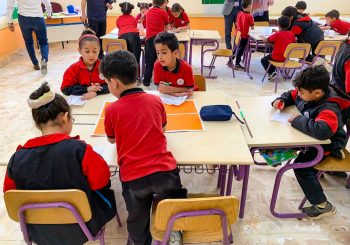In a bustling Cairo café, a group of secondary school students huddled around a laptop, excitedly demonstrating their new study companion: ChatGPT.
Across Egypt, from Cairo to the coastal cities and the Nile Delta, such scenes are becoming common. The Artificial Intelligence (AI) chatbot, launched globally in late 2022, has quietly found its way into Egyptian classrooms and is stirring both enthusiasm and anxiety in equal measure.
A New Tool Reaches Egypt’s Classrooms
Although ChatGPT was not initially available in Egypt, tech-savvy students quickly found workarounds to access it. Its appeal is obvious: the generative AI can produce essays, summarize lengthy texts, or answer complex questions in seconds. In a country with over 25 million students enrolled in schools, the potential impact on learning is profound.
“AI is a fact of life. You can love it or hate it, but it is here—and it is here to stay,” says Rola Hussein, an IGCSE English literature teacher in Cairo. “The only safe way around it is proper training.”
Hussein describes using short, guided activities—idea generation, practice questions, and scaffolded explanations—followed by in-class tasks that require each pupil’s own thinking.
Students are adapting too.
Yassin*, a ninth-grader at a private school in Fifth Settlement, says homework that once took hours now takes minutes. “I am now able to socialise and focus on sports more,” he explains, adding that some classmates “lean on it too much when no adult is watching.”
“Use it to learn, not to copy”: A Student’s Ethical Playbook
For Omar*, a Grade 10 pupil at a private school in Giza, the chatbot is a coach rather than a ghost-writer. “I treat ChatGPT like a study partner, not a writer,” he says. “I ask it to break down a topic, quiz me with new questions, or point out gaps in my outline, then I write everything myself.”
Omar sets a pen-and-paper outline before opening any AI tool. “If the bot gives me a fact, I verify it in the textbook or an original source,” he says. “If I use AI to brainstorm or get feedback, I mention that in a note at the end.”
New classroom policies have made a difference: more in-class writing and oral follow-ups. “If I cannot explain my work, I lose marks,” he adds. “That forces me to understand, not just produce.”
Google on Guardrails, Curiosity and Parental Controls
Tech companies say AI can support learning when used responsibly.
“Every day we see students using Gemini and our other AI-powered tools like Search or YouTube for help with their homework, they are checking their work, learning how to solve a problem correctly, asking follow-up questions, or doing research and getting feedback on an idea or concept,” says Dalia Elfiki, Communications and Public Affairs, MENA Google.
“The key to getting the most from AI—like any technology—is knowing how to use it responsibly, ethically and effectively as a learning tool,” Elfiki adds. “It is why we have worked closely with teachers and educational experts to infuse pedagogical principles into what we are building, to make learning more effective, efficient, and engaging while igniting a student’s curiosity.”
Elfiki stresses that Google’s generative AI features are designed “to help children explore new concepts, brainstorm topics, and spark creativity—promoting more critical thinking, not replacing it.” She notes that Google enabled sign-in for children under 13 on Gemini Apps, with parents able to manage a child’s Gemini settings via Family Link.
ChatGPT’s spread in schools has rung alarm bells for many educators and parents. Could students rely too much on AI tools, undermining their own critical thinking and creativity? Could a chatbot even replace human teachers one day? These questions are no longer hypothetical. Academic integrity is a prime worry: Tarek Shawky, Egypt’s former education minister, estimated that the cheating rate in pre-university exams was already about 85 percent even before AI became a factor.
When used deliberately, teachers say generative AI can support differentiated learning, idea generation, and language practice. International studies suggest comparable patterns: teachers use AI to draft materials, personalise practice, and save time—provided schools set clear guardrails.
Ministry Guidance and the Way Forward
On 15 May 2025, President Abdel-Fattah Al-Sisi directed the government to study making AI a mandatory subject in schools. Later in August 2025, the State Information Service (SIS) reported the Education Ministry would introduce an AI course for first-year secondary students as a pass/fail subject not included in final grades, alongside broader teacher-training on digital tools.
So far, Egypt’s Ministry of Education has not issued specific nationwide regulations on students’ use of AI tools, and the country is not alone – globally, schooling systems are still catching up to the rapid emergence of generative AI.
Here in Egypt, AI rules and regulations have not been codified on the school level yet. In practice, it has been left to individual schools and teachers to set ground rules. Some have updated their academic honesty policies to treat uncredited AI-generated work as plagiarism. Others, as in the case of Al-Azhar institutes, have taken a conservative stance of discouraging these tools outright.
Meanwhile, the Ministry is focusing on the bigger picture of improving AI infrastructure and skills.
Mohamed Abdel-Latif, Minister of Education and Technical Education, has been encouraging teachers to embrace AI in order to better prepare students.
On 23 August this year, Abdel-Latif emphasized training educators in artificial intelligence and digital tools, affirming that the goal is not to replace teachers with technology, but to empower them. He stressed that digital tools can help overcome geographic and economic disparities in education by expanding access to quality content. Under a government programme, free tablet devices have been distributed to secondary students nationwide to facilitate e-learning. The Ministry is also developing an AI-powered online platform for education and reviewing curricula to include more on programming and AI concepts.
Bridging the gap will require open dialogue between students, teachers, parents, and policymakers. Back in the café, the high schoolers eventually pack up their laptop – homework done with a bit of help from their AI friend, and debate the merits of their new approach. Their verdict captures the nuance of the issue. “It saves time, but you have to use it right,” one student says with a grin, “or you’re only cheating yourself.”
*Names changed because of minor status.







Comments (0)